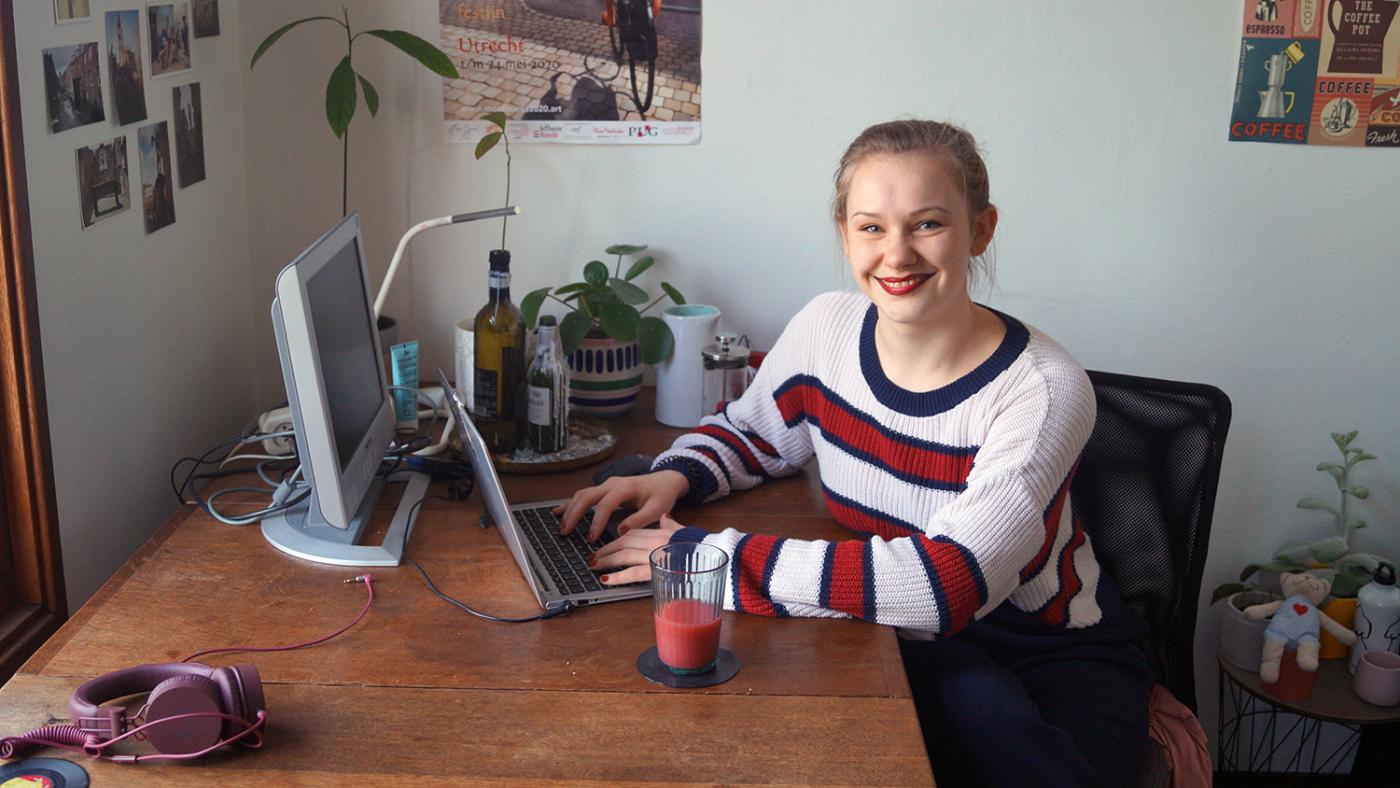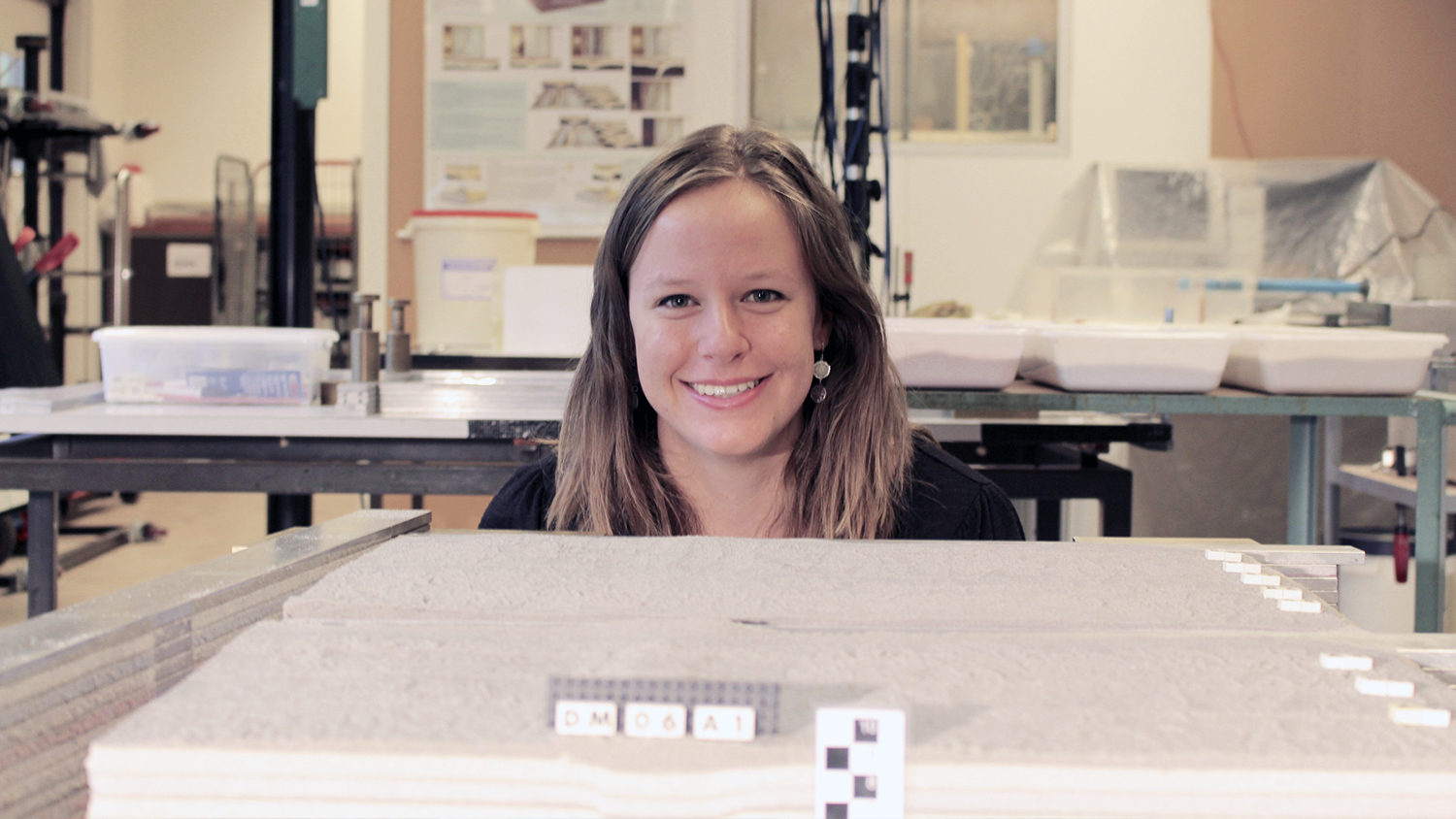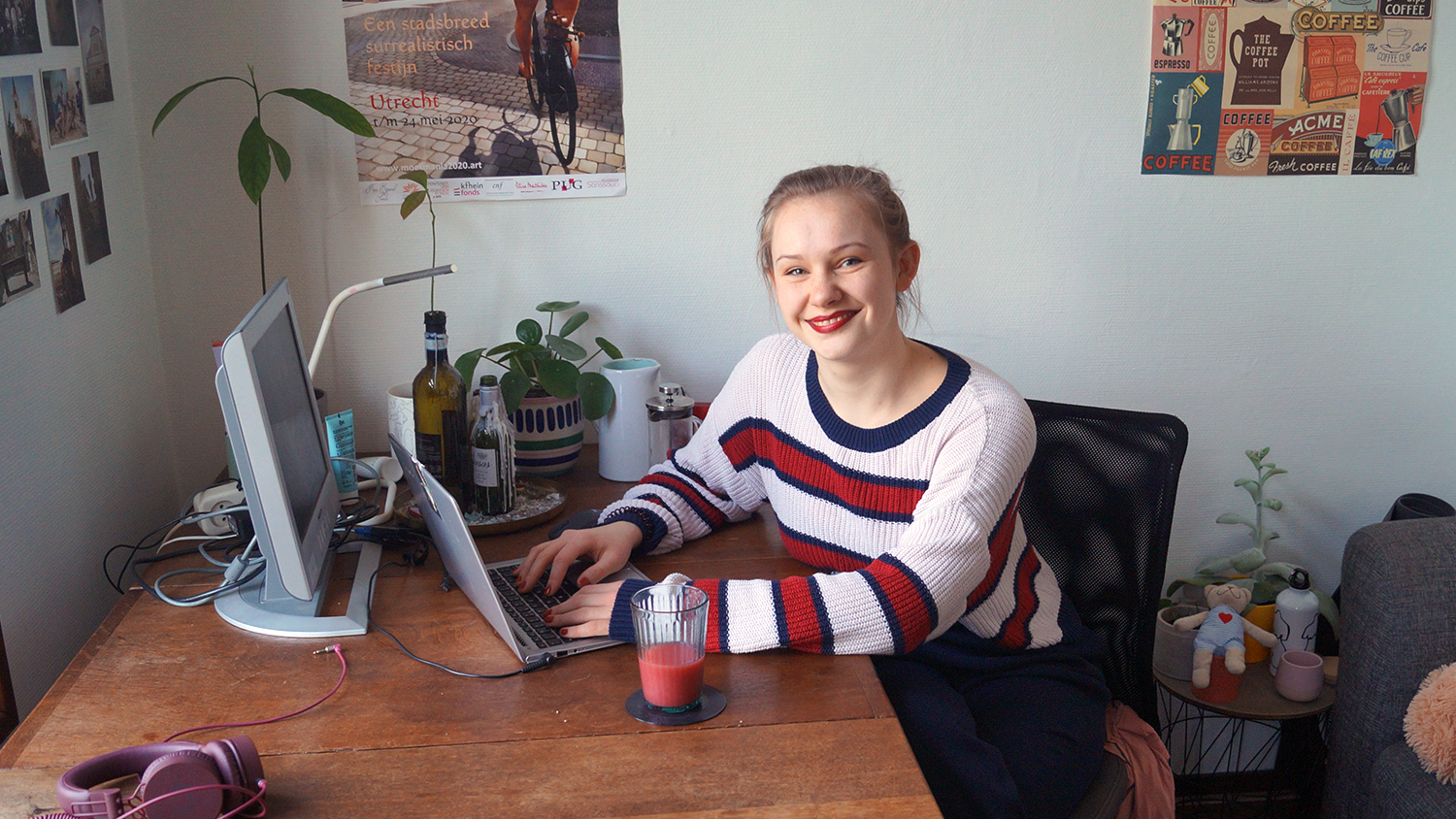Student assistants: the students helping with technical matters, proof-reading and teaching

‘I give online lectures from my room’

Dieke, second-year student in the Earth Structure & Dynamics Master’s programme: "As a student assistant, I basically give digital lectures. I do that for three broad, first-year Bachelor’s courses: Earth System 1 and 2, and Time & Causality. I enjoyed taking them when I was in the first year of my Bachelor’s and now I get to see how secondary school pupils develop into university students. I have been a student assistant for 4.5 years.
"This semester I am mostly busy with Time & Causality. I teach two-hour classes for a group of 23 students twice a week, and I get one hour to prepare. I have been doing this for three years in a row now, alongside another student assistant. Until November last year, I did it at the University, now I’m doing it from my room. It's doable and I don't need much space. I often use PowerPoint and I can write things out on an online whiteboard”.
"Back when I still gave lectures on campus, it was sometimes hard to keep enough distance from the students. Online there’s a different kind of interaction and students are more anonymous because you only see them when they have their camera on. I always have them turn their camera on and ask everyone how they are doing and if they have any questions.”
"In addition to the lectures, I also review students’ papers to relieve the teacher. After I look at them, the teacher checks them again. Additionally, each week the students do a simple experiment that I have to check. For example, as a first-year Bachelor’s student, I investigated whether an egg breaks faster if you drop it on the top, which is more convex, or the side, with is less convex”.
"I became a student assistant when a senior student asked if I was interested. At the time, I was looking for a side job that didn't require a lot of time, so that worked out nicely. Besides, I like being in touch with freshmen. I earn just above the minimum wage, which is not enough to cover my rent, but I can use it to pay for my groceries. This work takes me about seven hours a week. The fourth block will be quieter because the students will have fewer courses and they’ll have to do field work to see the rocks and fossils they are learning about. As for me, I’m planning to do fieldwork for my Master’s in southern Spain. But whether that’s actually going to happen remains to be seen".
'I was flattered when the coordinator asked me to do this'

Jane, Master's student in the Literature Today programme: "I have been a student assistant for the one-year Master's degree in Literature Today since the beginning of the academic year. Starting this month, I will also be doing it for the Bachelor's degree in Literary Studies. For the Bachelor's, I’ll help organise the educational interview where students give feedback on the programme, the student-for-a-day event, and the matching. Last semester I was working eight hours a week, now a little bit more. I’ve helped three courses by giving of online lectures and assisting with the technical side of online teaching, like giving students the turn when they held up their virtual hand and muting them when needed. It can be chaotic for teachers if they have to monitor all that themselves”.
"Every week, the students write a paper reflecting on a discussion they’ve had in class and I am the one checking it, so that the professor only has to go over it briefly. In collaboration with the IT department, I also created a website with essays written by students about Dutch literature and climate change. I also had other tasks, such as scanning chapters from textbooks in the University Library and checking the syllabus. In the second semester, the students are supposed to do an internship and work on their thesis, so there isn't much for me to do for the Master's students right now.
"What I still do at the moment for this Master's is serve as managing editor for RevUU, the journal of Literature Today students and Research Master’s in Comparative Literary Studies. That requires me to hold an online meeting every two weeks. I keep an eye on what is happening and intervene if necessary. Having to do everything online makes for a lot of miscommunication. For example, the artist who made the portraits of the authors caused a fuss and the fact that we couldn’t meet face to face didn’t help”.
"I will serve as a mentor for first-year students in the Literary Studies Bachelor’s programme, trying to make students connect with each other, which is pretty tough during a lockdown. We wanted to go out for drinks together but we can't. I’ve noticed that students prefer to interact face to face, because online things can get uncomfortable quickly. I also helped out with the games held in one of the University’s intro days. Currently, I'm working on arranging a social activity for the entire Master's programme, including the teachers”.
"At the end of the last academic year, the coordinator asked if I wanted to do this work, thinking I would be good at it. I was flattered, I thought that was so cool, not everyone is asked to do this job. The job I used to have, in the hospitality industry, was physically demanding, and I also thought it would be fun to work with the courses I took myself, not to mention getting to know students who also have an interest in literature".
‘I understand teachers now that I know what they go through’

Photo: DUB
Marieke, fourth-year Bachelor's student in Sociology: "One of my roommates is a student assistant at Sociology as well. She recommended me to the coordinator when he asked her if she knew anyone who wanted to do the same job. There was no application process and I didn't have to explain anything, which I thought was kind of crazy. Maybe they looked at my grade list – I do get good grades”.
"This semester, I'm teaching two seminars a week for a group of ten students in the Social Networks course, alongside the teacher. It's nice to give seminars as a duo, because we can talk to each other when we’re struggling with something. I basically take care of the technical side, but sometimes I teach the group myself. That's nice, but it's not really the intention. Since I’m a student myself, I would prefer to have a teacher do the teaching instead of another student. Once a week, I arrange the technical support for the Social Inequality course and last semester I answered students’ questions for the Advanced Sociological Theory course.”
"Until November, I was giving seminars on campus. I do miss that, there is more hassle online, you have to share your screen, not to mention that drawing on a whiteboard is a lot easier when you have a physical whiteboard. Switching to online classes was chaotic, but we've managed to find a solution.”
"Besides the seminars, I take care of the technical side, such as recording lectures and moderating the chat. Later this term, I will also be checking assignments with a worksheet and entering grades. Teachers could use quite a bit of support in creating their online lessons. Since the lockdown, I have actually been busier and I think there is more need for student assistants”.
"The huge workload teachers have sometimes spills over to me as well, which is quite stressful at times. I get paid for a little less than ten hours a week, but sometimes I spend more time working than I would like. After all, I am also working on my thesis. But I love being involved with sociology because I can transfer the knowledge I gained in my studies and, fortunately, I am free to speak up when something doesn't work out. It's fun to be on the teacher’s side during lectures and interesting to see what teachers go through. This experience has also given me a better understanding of teachers’ workload. Now I understand why things sometimes don't go as smoothly as they should".
Utrecht University has around a thousand student assistants. The collective agreement states there are three scales for these employees. A Master's student is in salary scale 4, a Bachelor's student with more than 120 credits falls within salary scale 3, and an entry-level Bachelor's student gets the salary scale 2.
Considering the increase in the amount of students enrolled in 2020, and the fact that teachers need support to teach students remotely, Utrecht University has allocated an additional 2.9 million euros for this calendar year to ease the teachers’ workload. The faculties can decide themselves how to spend this money, but they often choose to hire more student assistants. Like Marieke, Jane, and Dieke, they will help lecturers to give online lectures and connect with students, now that they no longer offer classes on campus.
In addition, because of the corona crisis, the Dutch cabinet has also allocated additional funds for universities in 2021, which allows UU to use this financial support for about 50 full-time jobs for the period of a half year. These must be new, temporary jobs in the a salary scale just above the minimum wage. Here, too, the University wants to employ students. However, instead of supporting lecturers, most of them will help with supporting services, such as supervising buildings, offering computer help, helping the educational administration, and performing at educational platform Educate-it. Some students will also work at the faculties.